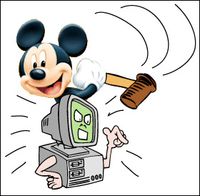Think of this as Volume 17, Number 12 of A-Clue.com, the online newsletter I've written since 1997. Enjoy.

misses the point.
Content has a price, always. Whether
you're reading content, listening to it, or watching it on a screen,
the price is your time.
Time is the most valuable asset any of
us have. Our time is limited. We must spend big hunks of it sleeping,
eating, and traveling. We spend a third or more of our time making
the money we need to sustain us.
What's left, the time available for
content, is thus very precious.
I got a clue on this when I received an
Amazon Kindle Fire for Christmas. I'd gotten Amazon Prime for the
cheap shipping, thus I suddenly had access to all sorts of “free”
content. Lots of TV shows I missed, lots of movies. Too many, it
turns out. When I try to catch up on a series I thought I'd like, I
find I'm taking time away from reading I could be doing.

got into “The Good Wife,” a legal thriller that gradually becomes
a series of stories on technology issues. It's great. I watched three
episodes back-to-back-to-back, and then found my dear wife heading
for bed without me. I'd missed our whole evening together, and barely
made any progress on the show. There was also a whole stack of books
staring at me the next morning, demanding to be opened.
It's not money for content that's in
short supply, it's time for content.
The problem for purveyors of content is
they don't know how to monetize time beyond advertising, which
usually aims to steal bits of time from us. We call this the
attention economy.
What the Internet is supposed to be
about is monetizing time. All the big data collected on our Internet
use, the dossiers Google and others have on us, all the social media
folderol is aimed at transforming advertising, from something that's
an annoying interruption into something that's of real service.
Businesses have two sets of costs. The
cost of what they're making represents half of what they spend.
Getting it into the hands of consumers is the second half, and most
of that consists of some kind of marketing.

is just a tiny part of that. The content owner throws up some
billboard space before a defined audience, and the advertiser rents
that space. The message, and whatever follow-up activity is needed to
take someone down the sales funnel, turning suspects into prospects
and getting prospects to buy, is all on the guy buying the ad. Thus
content's involvement in modern marketing is very limited.
An ad that provides no service, that
doesn't drive you down the sales funnel, that doesn't turn you into a
buyer, is a waste of your time and the advertiser's budget. If that
waste could be eliminated, if ads truly became service, the time you
spend with content would be more than paid for. The ad would be
pushing you further down the sales funnel, thus it would provide more
value to the person buying it. And we're always in the market for
something. The question is always, what.
So marketing behind content is all
about turning your time into someone else's money. Yet you remain in
control of both, your time and your money. The reason most of us
resent the ads is because they don't provide real service, they seem
to be wasting our time, and they are. They're also wasting
advertisers' money.

paying for content with money. Considering the value of our time,
this seems silly. It's always going to be just a tiny fraction of the
time's value. The taking of your time is of immense value, and should
be sufficient for nearly any content provider.
When I place an actual dollar value on
content, demand that you spend $5 to watch a two-hour movie, then I
should at the very least not advertise alongside it. The marketing
funnel is worth more than any content reasonably costs. The moves of
two London newspapers to drop prices to zero on their printed
products should prove that.
But content makers will continue to run
themselves down the drain. Newspapers will keep putting up paywalls,
cutting their audiences 90% and making themselves worthless as ad
vehicles. All we can do is replace them, see their stupidity and
failure as an opportunity.
Publishers wanted.










